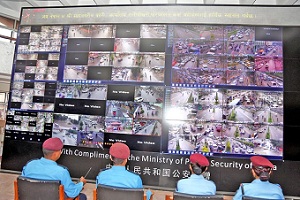Privacy Rules-2020, which were recently issued by the Nepal government, allow government offices of the federal, provincial and local levels to instal CCTV cameras in public places and public vehicles for security of lives and property. As per the rules, government offices may install CCTV cameras in coordination with the nearest police office.
“Information about installation of CCTV cameras for managing public security and public movement should be provided to the concerned district administration office,” read the rules.
The concerned person or organisation can install CCTV cameras at banks and financial institutions, shopping malls, hotels, service centres, jewellery stores, industries, factories and other commercial and business hubs with the approval of DAO.
However, no one is allowed to install CCTV cameras in toilets, bathrooms and changing rooms. According to the rules, every person or organisation concerned has to maintain records of CCTV footage for at least three months and provide it to Nepal Police and other government agencies as solicited for investigation. “No CCTV footage may be used for public or commercial purpose,” state the rules. If any CCTV camera is to be replaced or repaired, the person concerned shall obtain permission from the DAO or the nearest police office. The provisions stipulated in the rules also prohibit the use of CCTV cameras to invade privacy and human rights of citizens.
The district police office concerned will collect details of CCTV cameras installed in its working area and send them to the corresponding DAO. The DAO may depute an inspection and monitoring team to ascertain whether the organisations or persons operating the CCTV cameras have complied with the existing law. Anyone who installs and operates CCTV cameras contrary to the law will be liable to legal action under the Electronic Transactions Act, according to the rules.








